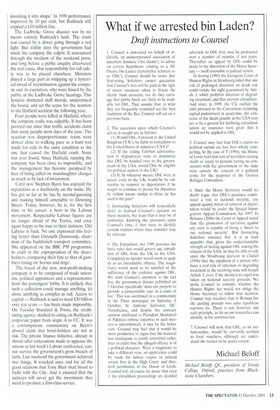What if we arrested bin Laden?
Draft instructions to Counsel
1. Counsel is instructed on behalf of alQa'eda, an unincorporated association of uncertain domicile (the clients'), to advise on certain hypotheses relating to a Mr Osama bin Laden (hereinafter referred to as 'ObL'). Counsel should be aware that Instructing Solicitors cannot guarantee that Counsel's fees will be paid in the light of recent measures taken to freeze the clients' bank accounts: nor do they envisage that public funds are likely to be available for ObL. They assume that, in what they are frequently reminded are the best traditions of the Bar. Counsel will act on a pro bona basis, 2. The questions upon which Counsel's advice is sought are as follows: (1) Would ObL, if present in the United Kingdom ('UK'), be liable to extradition to the United States of America (USA)?
(2) If the ruling Taleban administration in Afghanistan were to determine that ObL be handed over to the government of the USA, would ObL be eligible for political asylum in the UK?
(3) If, by whatever means. ObL were to secure entry to the UK, would he be vulnerable to removal or deportation if he sought to continue to pursue his objectives by violent means similar to those he has used in the past?
3. Instructing Solicitors will respectfully defer to learned Counsel's opinion on these matters, but trust that it may be of assistance, knowing the pressures upon Counsel's time, if they were to identify certain matters which they consider may be relevant.
4, The Extradition Act 1989 provides the basic rules that would govern any extradition of ObL from the UK to the USA. Conspiracy to murder would seem to qualify as an extraditable offence. The magistrates would need to be satisfied of the sufficiency of the evidence against ObL. We draw Counsel's attention to the fact that the government dossier published on 5 October specifically 'does not purport to provide a prosecutable case in a court of law'. This was confirmed in a commentary in the Times newspaper on Saturday, 6 October, by Anthony Scrivener, QC. Nonetheless, and despite the contrary opinion attributed to President Musharraf of Pakistan (whose expertise in such matters is unconfirmed), it may be the better view. Counsel may feel that it would be more productive to argue that the material was inadequate to justify committal rather than to claim that the alleged offence is of a political character. Were a magistrate to take a different view, an application could be made for habeas corpus or judicial review first in the High Court, and then, with permission, in the House of Lords. Counsel will, of course, be aware that even if the extradition proceedings are decided
adversely to ObL they may be protracted over a number of months, if not years. Thereafter an appeal by ObL could be made to the discretion of the Home Secretary — itself amenable to judicial review.
In Soeting (1989) the European Court of Human Rights in Strasbourg ruled that any risk of prolonged detention on death row could violate the right guaranteed by Article 3, which prohibits inhuman or degrading treatment, and thus prevent extradition. And since, in 1999, the UK ratified the sixth protocol to the Convention outlawing capital punishment in peacetime, the existence of the death penalty in the USA may per se be a ground for declining extradition unless an assurance were given that it would not be applied to ObL,
5. Counsel may feel that ObL's claims to political asylum are less than wholly compelling. In the case of T (1996), the House of Lords held that acts of terrorism causing death or injury to persons having no connection with the government of the state were outside the concept of a political crime for the purposes of the Geneva Refugee Convention.
6. Since the Home Secretary would no doubt argue that ObL's presence constituted a risk to national security, any appeal against threat of removal or deportation would be under the Special Immigration Appeal Commission Act 1997. In Rehman (2000) the Court of Appeal noted that 'the promotion of terrorism against any state is capable of being a threat to our national security'. But Instructing Solicitors consider that it is at least arguable that, given the understandable strength of feeling against ObL among the citizens of the USA, he may be able to rely upon the Strasbourg decision in Chahal (1996) that the expulsion of a person who faces a real risk of inhuman or degrading treatment in the receiving state will breach Article 3, even if the decision to expel was taken on national security grounds. We invite Counsel to consider whether the Human Rights Act would not oblige the Home Secretary to follow that decision.
Counsel may recollect that in Roman law the guiding precept was so/us republicae suprema lox. There is not, however, any such principle, as far as our researches can identify, in the common law.
7. Counsel will note that ObL, as an asylum-seeker, would be currently entitled to food vouchers, although we understand the matter to be under review.
Michael Beloff


























































































 Previous page
Previous page